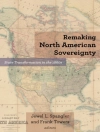Nationalism was declared dead too early. At the end of the Cold War, the postnational age was announced and liberalism claimed to have been victorious. Simultaneously, a postnational order was proclaimed. Transnational alliances like the European Union were thought to become much more important in international relations. Instead, we witnessed the rise of various forms of strong nationalisms all over the globe during the early twenty-first century and right-wing parties gaining more and more votes in elections often characterized by heavily nationalist agendas.
This volume shows how nationalist dreams and fears determine politics in an age that was supposed to witness a rather peaceful coexistence amongst nations by those who consider transnational ideas more valuable than national demands. The case studies in the book offer explanations of how and why nationalism made its way back to the common consciousness and which elements stimulated the re-establishment of the aggressive nation-state. Continuities of empire, actual or imagined, as well as the role of “foreign-” and “otherness” for nationalist narratives, are key in order to explain how, among other factors, globalization stimulated the rise of twenty-first century nationalisms.
关于作者
Frank Jacob, Nord University, Norway;
Carsten Schapkow, University of Oklahoma, USA.












